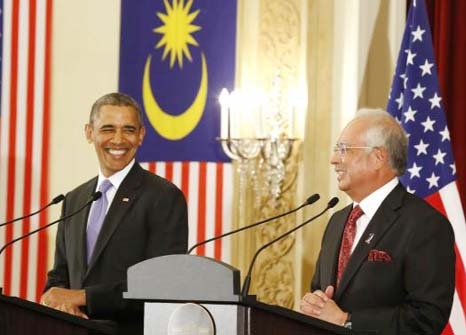
Reuters, Kuala Lumpur :
US. President Barack Obama on Sunday said the United States and Europe must join forces to impose sanctions on Russia to stop it destabilizing Ukraine, where armed pro-Russian separatists were for a third day holding eight international observers prisoner.
Washington and Brussels are expected, possibly as early as Monday, to name new people and firms close to Russian President Vladimir Putin who will be hit by punitive measures, but there is no consensus yet on wider economic sanctions. Speaking during a visit to Malaysia, Obama said any decision on whether to slap sanctions on sectors of the Russian economy at a later time would depend on whether the United States and its allies could find a unified position on how to proceed.
“We’re going to be in a stronger position to deter Un Putin when he sees that the world is unified and the United States and Europe is unified rather than this is just a US.-Russian conflict,” Obama told reporters.
The stand-off over Ukraine, an ex-Soviet republic of about 45 million people, has dragged relations between Russia and the West to their lowest level since the end of the Cold War.
Obama said Russia had not “lifted a finger” to get pro-Russian separatist rebels in Ukraine to comply with an international agreement to defuse the crisis.
“In fact, there’s strong evidence that they’ve been encouraging the activities in eastern and southern Ukraine,” he said.
Washington is more hawkish on further sanctions than Brussels, and this has caused a degree of impatience among some US. officials with the European response.
Many European countries are worried about the risks of imposing tougher sanctions, not least because Europe has extensive business ties with Moscow and imports about a quarter of its natural gas from Russia.
The head of German engineering giant Siemens, which exports to Russia, said on the sidelines of a meeting of conservative politicians in Bavaria that if sanctions were the only option he would back them, but he would prefer negotiation.
“I am still of the view that you have to talk with each other, not over each other,” said chief executive Joe Kaeser.
Since Ukrainians demanding closer links with Europe toppled their pro-Russian president in February, Russia has annexed Ukraine’s Crimean peninsula and massed tens of thousands of troops on the country’s eastern border. NATO has responded by sending reinforcements to eastern Europe.
The Western-backed government in Kiev accuses the Kremlin of planning to invade the east of Ukraine, and of preparing the ground by training and supporting the armed separatists who have seized about a dozen public buildings around the region.
Moscow denies interfering. It says Ukraine’s east is rising up in a spontaneous protest against what it calls an illegitimate government in Kiev which is mounting a “criminal” operation to suppress dissent.
Separatists who control the eastern Ukrainian city of Slaviansk are holding eight European observers who were in the area under the auspices of the Vienna-based Organisation for Security and Cooperation in Europe (OSCE).
The observers, from Germany, Sweden, Denmark, Poland and the Czech Republic, are accused by their captors of spying for NATO and using the OSCE mission as a cover.
Vyacheslav Ponomaryov, de facto mayor of Slaviansk, told reporters on Saturday: “They were soldiers on our territory without our permission. Of course they are prisoners.”
He said the separatists were ready to exchange the captured monitors for fellow rebels now in the custody of the Ukrainian authorities.

